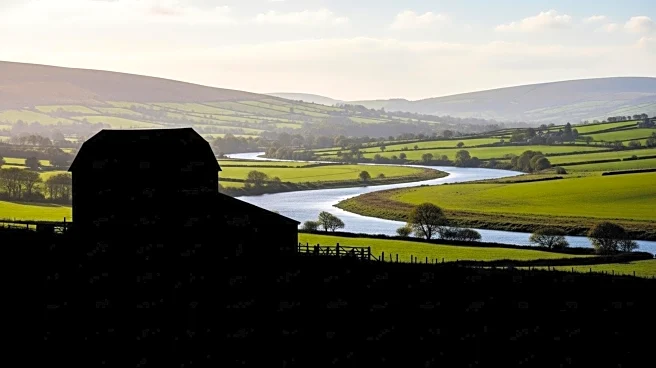What's Happening?
Farmers in Northern Ireland are experiencing uncertainty as they await the full implementation of the Farming with Nature (FWN) scheme, which is set to replace the Environmental Farming Scheme (EFS). Currently, only a limited transitional scheme focusing on habitat restoration is available, leaving many farmers, like Jack Kelly, in a state of limbo. Kelly, who has been working to reintroduce barn owls to his farm, has used EFS funding to create habitats for these birds. However, the transition to the new scheme has left him without clear guidance on future funding. The Department of Agriculture, Environment and Rural Affairs (Daera) plans to launch future phases of the FWN program from mid-2026, but the gap between the schemes is causing concern among farmers.
Why It's Important?
The delay in implementing the full FWN scheme has significant implications for farmers who rely on environmental funding to support biodiversity and sustainable farming practices. The uncertainty affects their ability to plan and invest in long-term environmental projects. Farmers like Kelly, who have already adapted their business models to incorporate wildlife conservation, face financial challenges without clear support from the new scheme. The situation highlights the need for timely and effective policy implementation to ensure that farmers can continue contributing to environmental conservation while maintaining their livelihoods.
What's Next?
Farmers are calling for clarity and timely implementation of the FWN scheme to avoid further financial strain and to continue their environmental efforts. Hundreds have reached out to Agriculture Minister Andrew Muir and assembly members, seeking information on the scheme's future. The response from Daera and the government will be crucial in determining the next steps for these farmers. The outcome will likely influence the level of participation in agri-environment schemes in Northern Ireland, which currently has the lowest uptake in the UK.
Beyond the Headlines
The transition period between environmental schemes raises broader questions about the sustainability of agricultural policies and their alignment with environmental goals. The situation underscores the importance of co-creation and farmer involvement in policy development to ensure that schemes are fit for purpose and effectively support both agricultural productivity and environmental conservation.








